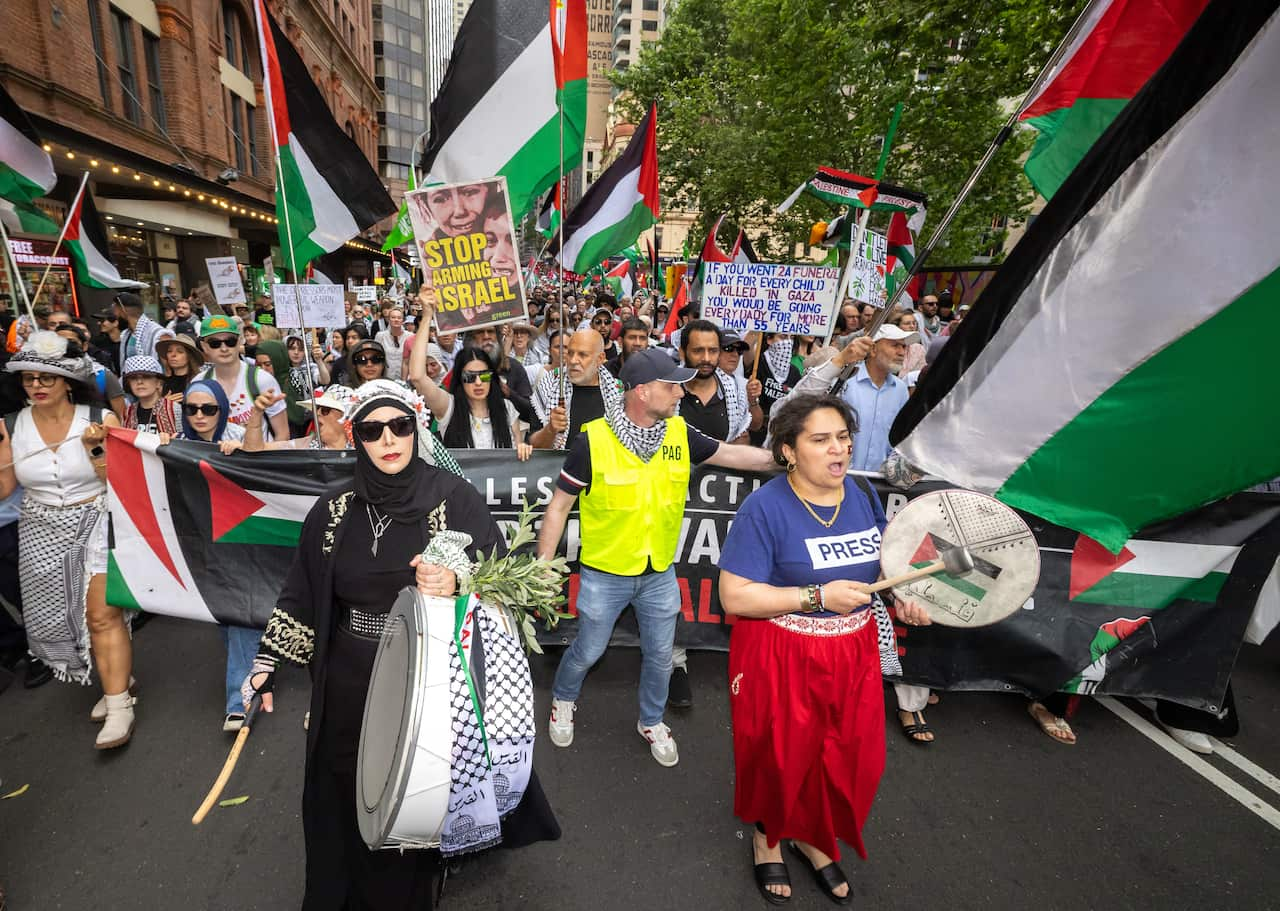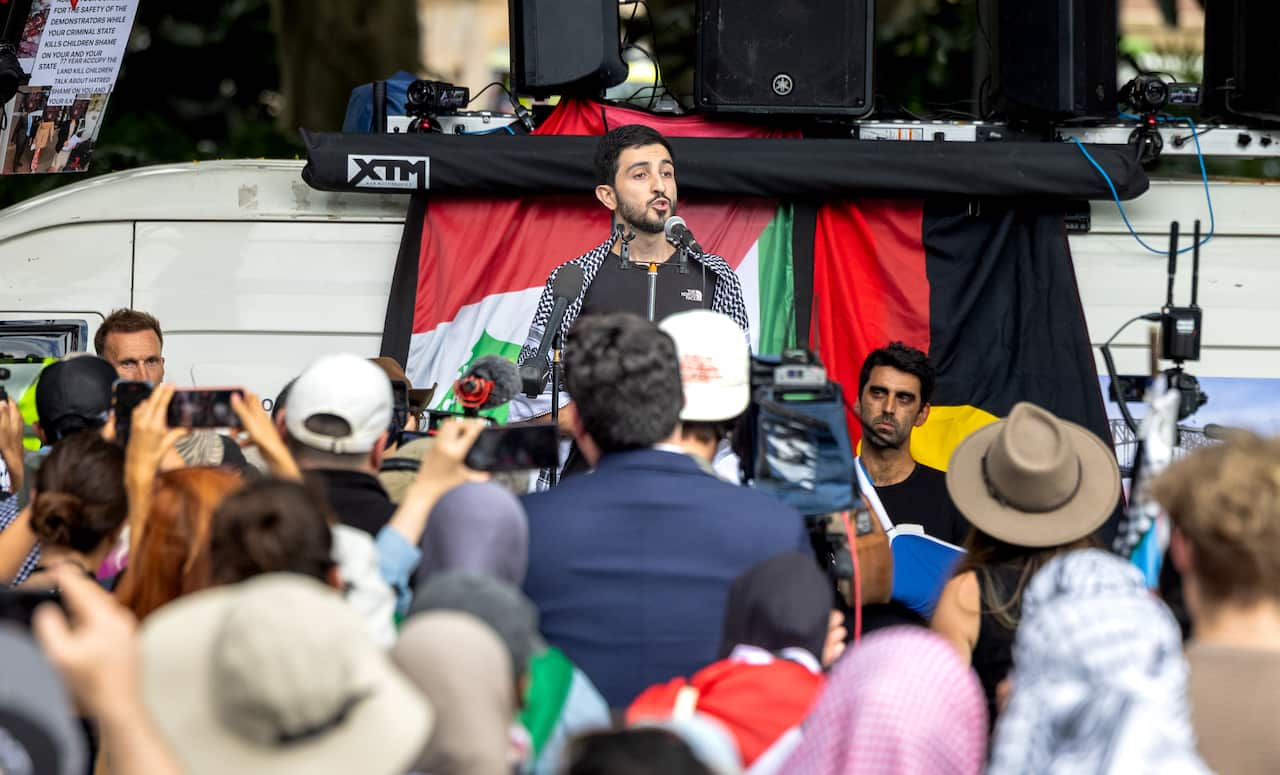Organisers of protests in support of Palestinians say they plan to continue marching in coming weeks, even amid a fragile ceasefire holding in Gaza.
Thousands of people gathered across Australia on Sunday in pro-Palestinian rallies to mark two years of the Hamas-Israel war, with some protesters expressing scepticism the ceasefire in Israel's two-year assault in Gaza would hold.
Around 27 protests took place across the country, including in Sydney, where plans to rally in front of the Opera House were scuppered after a NSW Supreme Court decision that ruled in the police's favour.
Palestine Action Group (PAG) estimated more than 10,000 people turned out for the Sydney rally, while NSW Police placed that number at approximately 8,000.
Victoria Police estimated 3,500 protesters gathered in Melbourne.
Protesters vow to continue
While a ceasefire was implemented on Saturday, protesters say they are worried it is "temporary".
Shamikh Badra, a University of Sydney political science PhD student originally from Gaza, was worried for the safety of his elderly mother and the rest of his family.

"We don't want a temporary ceasefire, we want to stop this genocide after two years of suffering and two years of watching and worrying," he told AAP as protesters banged on drums and waved Palestinian flags.
His brothers and several members of his family, including children, were killed. He does not know where their bodies are buried in the rubble.
"What if my family in Khan Younis move again and the bombing starts again? Perhaps it will be more dangerous than before."
Wearing a sling for his injured arm, Surya McEwen — another aid activist detained by Israel — had serious reservations about the ceasefire not being violated.
"Anytime there's a pause in fighting, Israel kills Palestinians and it has not stopped. It and the US are not honest brokers," he told AAP.
He hoped the lull in constant bombardment would provide a window of reprieve for millions of Palestinians stuck in Gaza and that expanded sanctions would be immediately placed on Israel.
"We have to push harder because of the ceasefire as a solidarity movement, not slow down."
The rallies took place against the backdrop of Israeli troops pulling back on an agreed-upon line under the first phase of a US-brokered agreement to end the war in Gaza, which has killed tens of thousands of people and left much of the enclave in ruins.
PAG organisers said the rallies would continue but would be scaled back to monthly instead of weekly.
The next nationwide protest will be held on 7 December.
Amal Nasser, an organiser from PAG, said people were marching to "commemorate over two years of genocide in the Gaza Strip" and called for the Australian government to impose sanctions on Israel.
Nasser was "incredibly concerned" that Israel would violate the ceasefire.
"But on top of that, Palestinians have nothing to return to. Over 80 per cent of the Gaza Strip is absolutely destroyed," she said.
"We have an obligation here in Australia to continue fighting."
NSW Supreme court ruling undercuts 'right to protest', organisers say
The Sydney rally was initially planned to take place at the Opera House, but routes were changed after a prohibition order by police was approved by the NSW Supreme Court.
Police said the event, which was estimated to have an attendance of 40,000 people, posed a crowd crush risk.

Organisers argued the march could proceed safely if the crowd was divided into smaller groups.
The Court of Appeal decision allowed officers to move on or arrest those gathering on the iconic building's forecourt. On Sunday, there was a visible police presence around the landmark.
Those who disobeyed the order could be considered in contempt of court, which can carry steep fines and prison time.
Nasser said the court decision was "incredibly disappointing", but they were still going to be marching "in our tens of thousands".
"We are also incredibly concerned that the Court of Appeal has reversed over 25 years of anti-protest law, which now means that if a court provision order is granted, anyone who marches to those locations will be held in contempt," she told SBS News.
"This is a very serious criminal offence.
"It is potentially unconstitutional and it certainly impinges on the democratic right to protest."
NSW has a permit system that allows protest participants to block public roads and infrastructure unless a court denies permission after a police challenge.
NSW Police tried to challenge a pro-Palestinian protest across the Sydney Harbour Bridge in August, but were unsuccessful.
Nearly 100 protests in two years
There have been more than two years of weekly pro-Palestinian protests in capital cities, amounting to nearly 100 rallies since October 7, 2023, when Hamas militants killed approximately 1,200 Israelis.
In response, Israel launched a two-year military offensive on Gaza that killed more than 67,000 people, including about 20,000 children, according to the United Nations.
Nasser said she believed the legacy of the protests would be similar to those that took place during the Vietnam and Iraq wars.
"This is the greatest crime in our lifetime. We are witnessing a genocide," Nasser said.
"History will show that the people in this country did everything they could to oppose this genocide and our government decided not to listen to the will of the people."
A September report by the United Nations Independent International Commission of Inquiry found that "genocide is occurring in Gaza and is continuing to occur".
Israel has repeatedly denied it is committing genocide in Gaza.
In September, Australia joined more than 150 countries by officially recognising a Palestinian state.
— With additional reporting by Australian Associated Press and Reuters.
For the latest from SBS News, download our app and subscribe to our newsletter.

